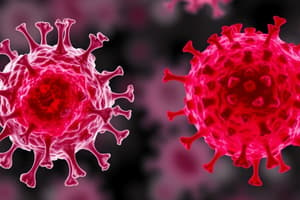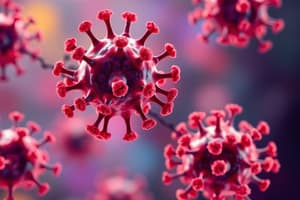Podcast
Questions and Answers
What is the primary function of a B-cell in the immune response?
What is the primary function of a B-cell in the immune response?
- To present antigens to T H cells (correct)
- To produce antibodies
- To activate cytotoxic T cells
- To recognize and eliminate infected cells
Which type of immunity is involved in the interaction between B cells and T H cells?
Which type of immunity is involved in the interaction between B cells and T H cells?
- Innate immunity
- Acquired immunity
- Cell-mediated immunity
- Humoral immunity (correct)
What is the term for the region on an antigen that is recognized by a T cell receptor?
What is the term for the region on an antigen that is recognized by a T cell receptor?
- Antigenic determinant
- Paratope
- MHC molecule
- Epitope (correct)
What type of MHC molecule is involved in the presentation of antigens by B cells to T H cells?
What type of MHC molecule is involved in the presentation of antigens by B cells to T H cells?
What is the term for cells that can internalize, process, and present antigens to T cells?
What is the term for cells that can internalize, process, and present antigens to T cells?
Which type of MHC is expressed on all nucleated cells?
Which type of MHC is expressed on all nucleated cells?
What is the primary function of MHC II?
What is the primary function of MHC II?
What is the result of the presence of foreign antigens on a cell that expresses MHC I?
What is the result of the presence of foreign antigens on a cell that expresses MHC I?
What is the unique characteristic of each lymphocyte?
What is the unique characteristic of each lymphocyte?
What is the role of CD4 on TH cells?
What is the role of CD4 on TH cells?
What is the primary difference between classical antigens and superantigens?
What is the primary difference between classical antigens and superantigens?
Which type of antigen requires antigen-presenting cells (APCs) to process and present epitopes?
Which type of antigen requires antigen-presenting cells (APCs) to process and present epitopes?
What is the role of MHC-II molecules in the immune response?
What is the role of MHC-II molecules in the immune response?
Which of the following is a characteristic of superantigens?
Which of the following is a characteristic of superantigens?
What is the main difference between MHC-II restriction and classical antigen presentation?
What is the main difference between MHC-II restriction and classical antigen presentation?
Flashcards are hidden until you start studying




